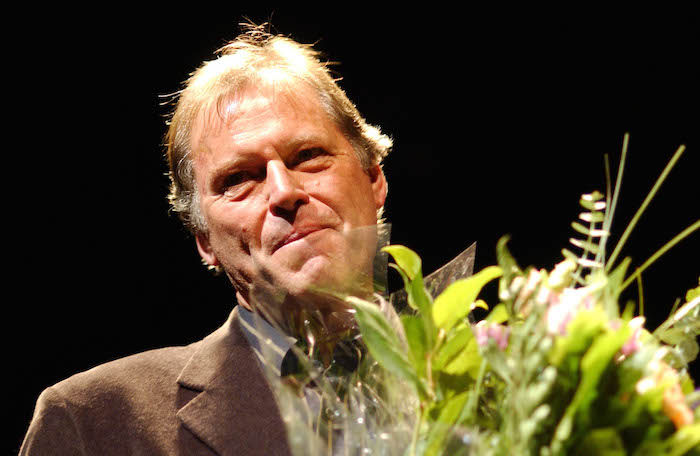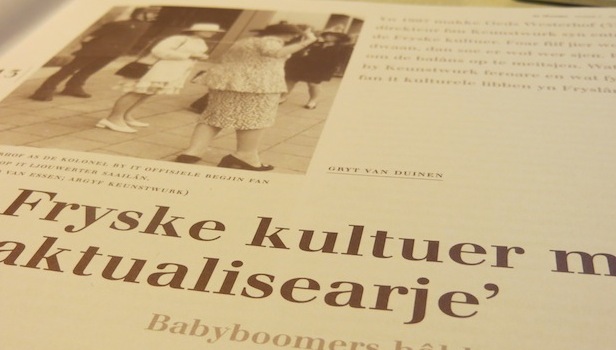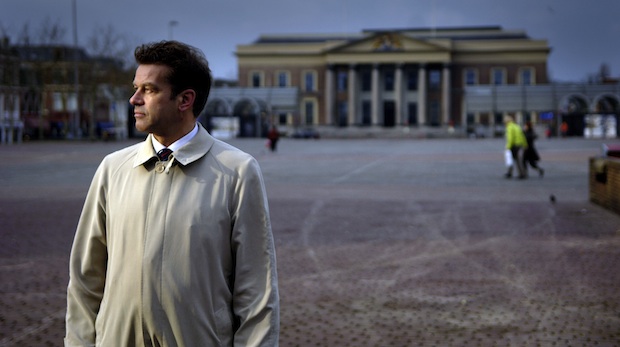The benefit of native speakers
Publisearre op 23 juli 2013
NYNKE VAN DER ZEE –
If you – being one of the few lucky ones – have had English in primary school, you will probably recall the sneaky snigger in the classroom when the teacher started to sing in his corny-English accent: “Twinkul, twinkul, liddel stàr”. But let’s be honest, teaching in English isn’t easy when it is not your first language. Therefore, many trilingual primary schools in Friesland are glad to welcome a native speaker in their classroom. One of them is Irma van der Kruis, who swapped her uptight Gooische euhr years ago for a classic British ahr.
Van der Kruis, that doesn’t sound really foreign, does it?
Laughing: ‘You’re right. I grew up in Laren, so I’m a Gooische vrouw actually. At the age of 20 and completely in love with an Englishman I decided to move to London. Later on I met my current husband Alan, born and raised in London. After living in the urban stir for more than nine years, we decided to move to quiet and easy going Friesland. In 1990 we ended up in Oudebildtzijl, where we both immediately were struck by the peace, space and silence of the impressive open landscape. It feels like living at the end of the world sometimes; the total opposite of our life in London. But it’s just what we needed.’
After 9 years in the City of London, how rusty was your Dutch?
‘I was surprised how quickly my Dutch vocabulary recovered. In contrast to my husband of course, who had never spoken Dutch before. By sticking little post its on doors, windows, the refrigerator he learned all the words. And I must admit: he’s a natural. At home now a days we’re using a mix of English and Dutch, because our kids were born here and speak Nederlands. It’s funny to see how both languages are essential parts in my life. My job as native speaker teaching the Frisian kids English completes the circle.’
In the classroom you’re still working with post its?
‘If that were true! No, my approach is to teach children this new language by playing with words, sounds and later on writing and pronouncing it. Particularly nursery children are very capable of understanding and using a new language. Playing, singing, dancing, everything is possible. For example, I show them balls with different colours and point at the blue one. Saying: ‘That’s the blue ball’ is enough to make it clear. Then I point at a child and ask him: ‘Do you have something blue?’ Immediately all these little ones are busy searching for something blue: from their jeans down to their underwear. Great to see how quickly they adapt to a new situation.’
And after the underwear comes..?
‘When the kids grow older, in group 3 and 4, I introduce little games to rehearse the words. Therefore I also use flash cards, with all kind of subjects referring to a specific theme. For example body parts, when kids learn naming their nose, ears, eyes, head. We often play a game called Simon Says, which you can compare to the Dutch game ‘Commando Pinkelen’. On my command children have to point out their body parts. It’s a playful way to rehearse words and expand their vocabulary. From group 5 up till 8 we start with writing and reading. My job is to stimulate their understanding, reading and speaking.’
And all the time – from nursery aged kids to pubescent twelve year olds – you never say a word in Dutch?
‘My method is that I don’t speak Dutch in or around the school building. Not a word. That’s weird for most of the children at first. “Kun je ook normaal praten?” one of the kids asked me a year ago. Now they are used to talking English to me. It’s just a button they need to switch. When miss Irma is around the main language is English. And after a while I notice that it is becoming natural to all of my classes. By only using English I lower the bar for the children. ‘It doesn’t matter if you make mistakes, we are all here to learn’, that’s my vision.’
And how do the teachers respond?
‘The first reaction in the teacher room is a mixed feeling of shyness and awkwardness. Most of my colleagues feel a little embarrassed because they might only speak English on holiday. But after a while they loosen up. And I must say, the majority of them are good enough to excellent. That’s the whole thing: to feel comfortable in a foreign language. Compare it to maths or history; once you get to grips with the subject matter, it gets fun.’
What’s the benefit for a school bringing in a native speaker?
‘The main reason every primary school – whether it is trilingual or not – should engage a native speaker is because it’s the best stimulation for both children and staff. The word ‘native speaker’ says it all: it’s in our nature to speak English. We never switch back to Dutch, because we don’t have to. We know the words to explain difficult questions, we possess the knowledge behind the secrets of our grammar and most important of all: we share the passion for our language. To really stimulate learning a second or third language, you need that kind of commitment. The love of your language, it’s the most essential ingredient for success.’
And your personal success ingredient?
‘Wearing a smile every day, I suppose. My goal is making English an easy and fun second language by being an inspiring role model. I’m searching for new elements every day; ways to make my time with the kids encouraging and instructive at the same time. See them in the last grade and hear them saying: I can do it, I dare to and English is fun. That’s my ultimate reward.’
Kategory
Tags
Diel dit artikel!
Relatearre artikels

MARITA DE JONG - ‘Under de tsjinjende laach sitte in protte oare dingen’ In tsjinjend fak. Sa omskriuwt komponist en musikus Cees Bijlstra (56) [...]

Kategory: Byldzjende keunst,kultuerbelied,Ynterview
GRYT VAN DUINEN - Yn 1997 makke Oeds Westerhof (37) as direkteur fan Keunstwurk syn entree yn de Fryske kultuer. Foar fiif jier woe er [...]

Kategory: Arsjitektuer,Byldzjende keunst,Ynterview
KAREN BIES – It waait noch like hurd oer it Ljouwerter Saailân. Sil de wyn lizzen gean as hjir oer in pear jier it nije [...]

